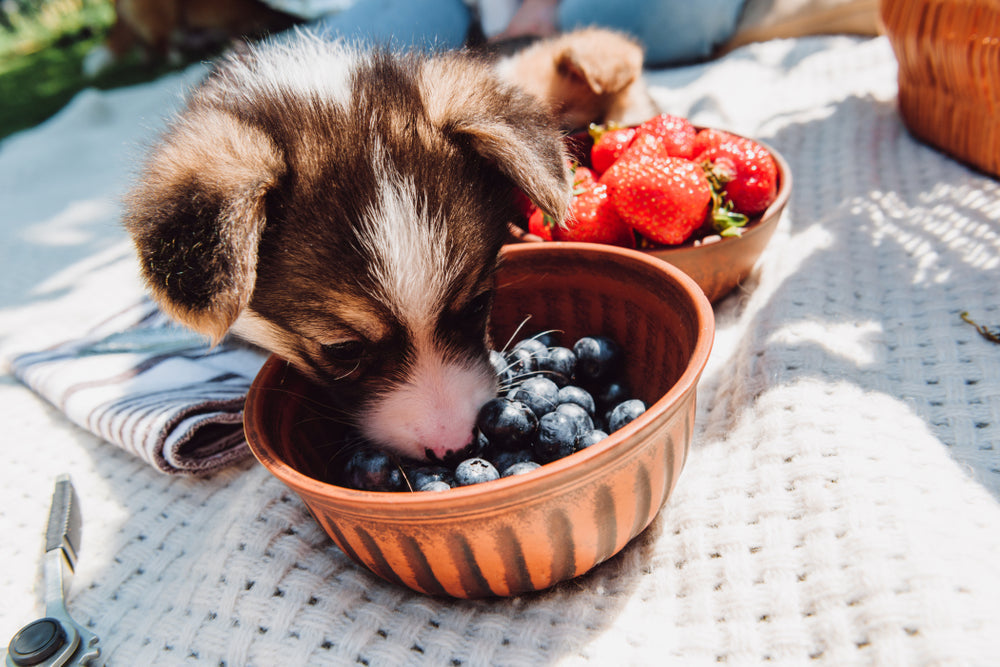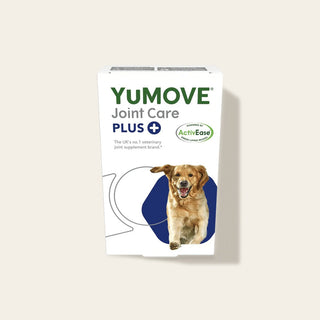

A-Z Of What Dogs Can & Can't Eat: Summer Edition
Our handy A-Z dog food guide lists the top seasonal foods your dog can and can’t eat.
We recommend speaking to your vet before introducing new foods to your dog, especially if they have special dietary requirements or digestive health concerns. If you’re ever worried about something your dog has eaten, please speak to your vet.
A: Can dogs eat apples and almonds?
Apple: Yes. Your dog can snack on a tasty treat of apple. High in Vitamins A and C along with dietary fibre, apples are a refreshing snack for your dog in the summer months. Please remember to remove the pips.
Almonds: No. Dogs can’t eat almonds. Almonds aren't as toxic as some other nuts for your dog, but they can cause digestive issues. It's safest not to give them to your dog.
B: Can dogs eat blueberries and bones?
Blueberries: Yes. Your dog can eat blueberries. Blueberries are a low-calorie treat full of fibre and Vitamins C and K. Most berries contain antioxidants and phytochemicals, which are great for dogs. However, be careful which berries. To be safe stick to blueberries, raspberries and strawberries as a seasonal fruity treat for your dog, but feed in moderation.
Bones: Yes and no. Bones from pet shops, play items, and uncooked bones bought from reputable retailers can be a good way to entertain your dog but we recommend always supervising your dog when feeding any of them. Be sure to check the bone isn’t too firm too, as this can put strain on your dog’s teeth.
Cooked bones, however, are harmful to dogs and should be avoided. Due to their fragility, they can splinter into pieces and cause injury to your dog.

C: Can dogs eat cucumbers and chocolate?
Cucumbers: Yes. Your dog can eat cucumber, not only is this a refreshing bite made up mostly of water, but this crunchy snack is also great for your dog.
Chocolate: No. Dogs can become ill when they eat chocolate. Although it's yummy to us, chocolate contains theobromine which is toxic to dogs. If you suspect or know your dog has eaten chocolate, you should call or take them to the vet immediately.
E: Can dogs eat eggs?
Eggs: Yes. Your dog can have cooked eggs which are a good source of fatty acids. They can also sometimes help to settle upset stomachs. However, it’s not advisable to give your pup raw eggs because, although not toxic, there’s a risk of Salmonella.
F: Can dogs eat fish?
Fish: Yes. Your dog can eat fish. However, this is another food you must be careful with when feeding your dog. Avoid fish cooked in oils or seasonings and make sure all bones are removed from the flesh to keep your dog safe.

G: Can dogs eat green beans and grapes?
Green Beans: Yes. Your dog can have green beans added to their dinner or as a snack. They’re high in Vitamin K and Vitamin C so are a great low-calorie snack for any dog looking to lose weight.
Grapes: No. Dogs can’t eat grapes. Although we might love them, grapes can be toxic to dogs and can cause kidney damage.
H: Can dogs eat honey?
Honey: Yes. Honey is a great summertime treat for your pup and is filled with antioxidants. Honey has lots of important vitamins and minerals, although should only be given in small amounts.
I: Can dogs eat ice cream and ice?
Ice Cream: Yes – occasionally. Your pup can have a lick or two of vanilla ice cream. However, as dogs can’t digest dairy, it is suggested a lick or two is the max. Too much ice cream can lead to indigestion and diarrhoea, and no one wants that on a hot day! Be careful with flavourings too, as these might not be safe for your dog. It’s best to avoid them if you’re not sure.
Ice: Yes – under supervision. Ice is ok for dogs, it can be a fun game for your pup and can cool them down in the hot weather, however, due to the fragility of ice, it is better to watch over them if you ever give them an ice cube. For more info on whether ice cubes are bad for dogs.

K: Can dogs eat kiwi?
Kiwi: Yes. Your dog can have kiwi fruit. A great summer treat, this tropical fruit can be enjoyed by your dog as long as you remove the skin and the pit first. Feed in small amounts, never as a whole fruit as this could be dangerous.
M: Can dogs eat mango and mushrooms?
Mango: Yes. Like us, most dogs love mango and they can enjoy this summertime favourite. As it’s high in sugar, it’s recommended only in small amounts.
Mushroom: No. Your dog can’t eat mushrooms. Although some mushrooms from the supermarket can be safe when cooked with no other seasonings and extras, it’s best to avoid mushrooms altogether, to stop your pup from seeking out dangerous wild mushrooms on walks as these can be highly toxic.
O: Can dogs eat oranges and onions?
Oranges: Yes. A segment or two of orange can be a great summer snack for your pup, full of vitamins to keep them healthy. Although, like most fruits, orange is best given in moderation.
Onions: No. Dogs can’t eat onions. Although a tasty part of our human diet, onions contain a compound called N-propyl disulphide which is toxic for dogs.

P: Can dogs have potatoes?
Cooked potato: Yes - in moderation. Your dog can enjoy a small taste of plain boiled potatoes. However, don’t feed them to your dog if they’ve been cooked in salt.
Raw potato: No. Do not give your pup raw potato as it contains solanine which is toxic to dogs.
Q: Can dogs eat quinoa?
Quinoa: Yes! Your dog can eat quinoa.
R: Can dogs eat rice and raisins?
Rice: Yes. Dogs can have rice. This can be a great addition to your dog’s dinner if they have an upset stomach, along with some plain cooked chicken.
Raisins: No. Like grapes, raisins can be toxic to dogs. It’s best to keep them out of your dog’s reach.
S: Can dogs eat spinach and salty foods?
Spinach: Yes. Spinach is high in iron and great for your dog’s diet. Add to their dinner for an additional hit of vitamins.
Salty food: No. It’s best not to give dogs the salty snacks humans love, such as crisps and other fast foods. Although they’re usually not toxic, it’s advised not to include them in their regular diet.
T: Can dogs eat tomatoes?
Tomatoes: No. It’s best not to give your dog tomatoes as they contain substances that can be harmful to them. Although not always toxic, they’re a food that can be an issue for dogs.
W: Can dogs eat watermelon and walnuts?
Watermelon: Yes. Watermelon is full of water and provides a crunchy yet satisfying snack for your dog. It’s best to remove the seed and definitely remove the rind.
Walnuts: No. Walnuts can be a choking hazard for dogs and contain a fair bit of fat. Some types of walnuts can be more toxic to our dogs than others so it safest to avoid them.
Y: Can dogs eat yoghurt?
Yoghurt: Yes. Your dog can eat yoghurt, although dogs aren't naturally able to digest dairy in large quantities so a few licks here and there is the maximum advised for your pup. Be careful of any flavourings though as these might not be safe for your dog. It’s best to avoid if you’re not sure.
Z: Can dogs eat courgette?
Courgette: Whether you call it zucchini or courgette, no matter, this is a great snack for your dog! One of the best veggies they can consume cooked or raw and great for their digestive health.
Could your canine companion use a bit of extra digestive support during their next summer feast? If so, we recommend giving them YuMOVE Digestive Care. It's ideal for dogs with sensitive tummies, supports digestive health, and tops up good bacteria while blocking bad bacteria.





